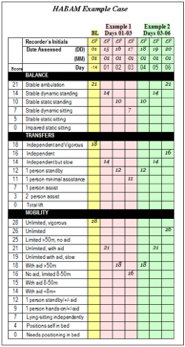Hierarchical Assessment of Balance and Mobility
╠ř
The Hierarchical Assessment of Balance and Mobility╠ř┬ę (HABAM) is an instrument that provides a clinical assessment of in-bed mobility, transfers and ambulation. The patient being assessed is asked to stand, transfer from the bed and walk as far as they are safely able. Their performance is observed and recorded for each of the three domains being measured (balance, transfer and mobility).
 During testing, patients should be encouraged to perform to the best of their ability - as they would usually do in the unobserved situations. Patients should be assessed using any usual aids (if used) ÔÇô for example, walking sticks, crutches, walkers or wheelchairs. ╠ř
During testing, patients should be encouraged to perform to the best of their ability - as they would usually do in the unobserved situations. Patients should be assessed using any usual aids (if used) ÔÇô for example, walking sticks, crutches, walkers or wheelchairs. ╠ř
The numerical scores assigned to each scale levels are weighted, such that the highest number is assigned to the highest level of performance and the lowest number to the lowest level of performance within each domain. ╠řFor example, in the mobility domain, ÔÇťUnlimited, vigorousÔÇŁ is the highest level of performance (scaled at 28), whereas ÔÇťTotal liftÔÇŁ is the lowest level of performance (scaled at 0).
The form here shows a patient who deteriorates over her first 3 days in hospital (example 1) and then steadily improves (example 2).
[PDF - 718 KB]
[PDF - 116 KB]
╠ř
References
MacKnight C, Rockwood K. . Age Ageing 1995:24:126-130.
MacKnight C, Rockwood K. J Clin Epidemiol 2000; 53(12):1242-1247.
Rockwood K, Rockwood MRH, Andrew MK, Mitniski A. Reliability of the Hierarchical Assessment of Balance and Mobility in Frail Older Adults. J Am Geriatr Soc 2008; 56(7): 1213-1217.
╠ř
Permission for Use
To guard against copyright infringement or unlicensed commercial use, we ask all potential users to complete a╠řPermission for Use Agreement via the╠řonline╠řPermission Request Portal.╠řAgreements are reviewed by the Industry Liaison Office at ║┌┴¤│ď╣¤═° to determine whether a license agreement is required. Requests for non-commercial educational, clinical and research use, as well as for reprint usually do not require a license agreement.
